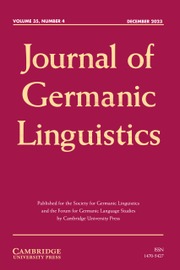Article contents
REGULAR MORPHOLOGY VS. PROSODIC MORPHOLOGY? THE CASE OF TRUNCATIONS IN GERMAN
Published online by Cambridge University Press: 09 January 2002
Abstract
This paper is a study of the morphology and phonology of truncations in German (also known as i-Bildungen) within the framework of Optimality Theory. Truncations are shown to constitute a widespread and productive morphological pattern in Modern Standard German. The morphosyntactic properties of these forms are shown to follow from the assumption of a regular binary word-syntactic structure in which the base functions as the head, and a phonologically empty morpheme adds other, non-head, properties. The specific phonological properties can then be derived from the operation of a set of ranked constraints in the sense of Optimality Theory. The analysis implies a strong correspondence between reduplication and truncation as two related aspects of prosodic morphology.A first version of this paper was presented in March 1996; the handout from this presentation (Wiese 1996) has been discussed occasionally since. Members of the research project Prosodische Morphologie (part of SFB 282 “Theorie des Lexikons”) at the universities of Düsseldorf and Cologne, in particular Chris Golston, Martin Neef, Renate Raffelsiefen, Heinz Vater, Markus Walther, and Anja Werner, have contributed to the early stages of the paper in different ways. In addition, I thank Susanne Niedeggen-Bartke, Caroline Féry, and Birgit Alber for helpful input, and two anonymous JGL reviewers for important criticism and clarifications.
- Type
- Research Article
- Information
- Copyright
- © 2001 Cambridge University Press
- 7
- Cited by




